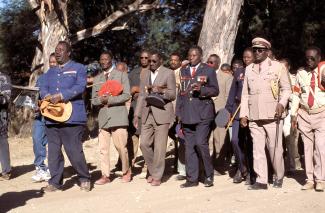Comment
The power of liberation movements
 Frans Lemmens/Lineair
Herero leaders commemorate their ancestors who died fighting for independence from German colonial rule.
Frans Lemmens/Lineair
Herero leaders commemorate their ancestors who died fighting for independence from German colonial rule.
On 21 March 2015, Namibia celebrated 25 years of independence. For a quarter century, the South West African People’s Organisation has been firmly in power, now called the SWAPO Party. In November 1989, it secured an absolute majority in elections supervised by the United Nations. In 1994, it did even better, winning a two-thirds majority. And in the most recent elections in November 2014, it got no less than 80 % of the vote.
Thanks to its super-dominance, SWAPO is broadly observing democratic rules – at least pro forma – and is even a role model for the African National Congress (ANC) in neighbouring South Africa. Since 1990 and 1994 respectively, SWAPO and the ANC have been in power. They are among the anti-colonial movements that never relinquished office after being elected for the first time. Other parties of this kind are the MPLA in Angola (1974), FRELIMO in Mozambique (1975) and the Zimbabwe African National Union (ZANU) in Zimbabwe (1980).
In spite of liberation, however, many post-colonial states cannot be said to have found real peace. The governments of Angola and Mozambique faced internal challenges from terrorist groups for decades, which reinforced their militarist attitude and actions. In Zimbabwe, Mugabe destroyed the opposition back in the mid-1980s in near genocidal massacres in Matabeleland. With the creation of the Movement for Democratic Change (MDC), a real opposition returned to Zimbabwe and would have superseded Mugabe and his government if there had been any measure of fair play in the early 2000s elections. Thanks to backing by the other southern African liberation movements in office, Mugabe managed to stay in power through brutal repression and tactical finesse. Today, the peoples of Angola, Mozambique and Zimbabwe all pay the price for their corrupt governments’ mismanagement of public affairs.
In Namibia, the consolidation of political power ensued without armed conflict. The socio-economic structures of the settler society remained largely intact. Basically, the privileged white minority has been joined by a new black elite, which essentially comprises first-generation members of the liberation movement and their cronies.
The Namibian gerontocracy has developed a cleptocratic mentality. It has sold the country’s wealth from mining and fishing without significantly raising living standards for the majority of the people. With an annual per-capita income of more than $ 6,000, Namibia qualifies as a middle-income country. But glaring income gaps show that the country has failed miserably in terms of socio-economic development. The SWAPO leadership accepts no responsibility for grievances, however, and continues to blame widespread poverty on long-overcome apartheid.
The predatory behaviour, which equates the party with the government and has turned the state into a “serve yourself” institution, is increasingly fuelling public resentment. Social tensions are becoming something like a time bomb. In the absence of serious alternatives, however, the party has so far found it easy to sideline any potential challengers. A pseudo-opposition, which is entirely driven by self-interest, is to be blamed.
The appeal to national pride matters. SWAPO seems to be healing colonial inferiority complexes and continues to be considered a beacon of hope. But democracy and destitution are ultimately incompatible. Namibia is not experiencing sustainable development. The limits of liberation are becoming increasingly apparent. The fact that outgoing President Hifikepunye Pohamba was awarded the Mo Ibrahim Prize for good governance in March was not a recognition of real excellence; it merely showed how rare good governance is in Africa.
Hennig Melber is director emeritus of the Dag Hammarskjöld Foundation in Uppsala and extraordinary professor at the universities of Pretoria and the Free State in Bloemfontein. He has been a member of SWAPO since 1974. His monograph “Understanding Namibia. The Trials of Independence” was published in December 2014 by Hurst in London.
henning.melber@dhf.uu.se


